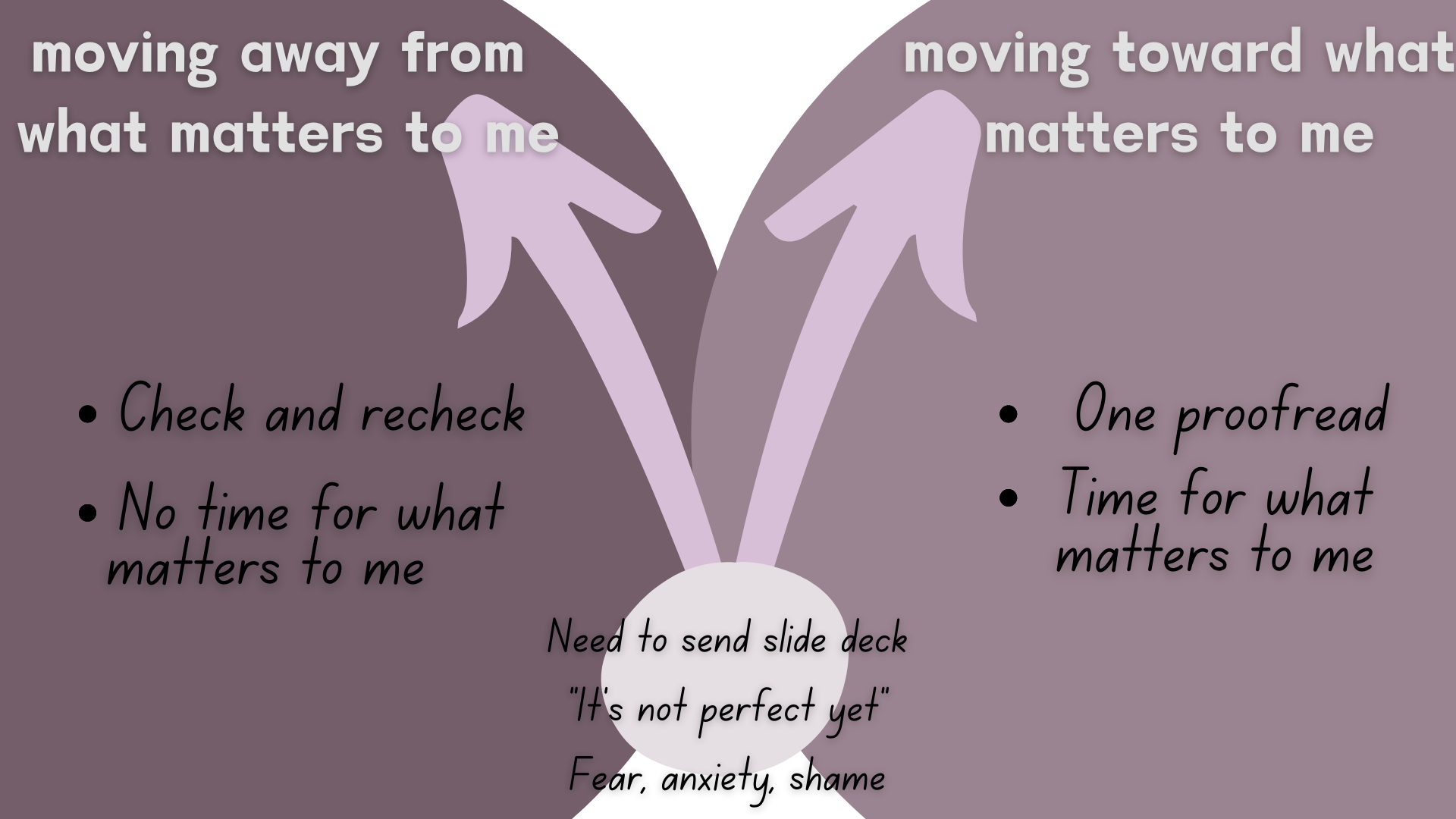How to Change
You’re excited to make a change in your life. Maybe you want to learn to manage your anxiety, to begin a meditation practice, or cut down on commitments. Already as a self-starter, you’ve got a plan, and are pumped to get started.
Most likely, if you’re an overthinker and overachiever, you set some pretty lofty goals for yourself. There’s a certain type of thinking that typically goes along with being an overthinker and overachiever that sometimes trips us up when pursuing our goals. It has many names – perfectionism, all or nothing thinking, black or white thinking…and it leads us to being susceptible to self-criticism or feelings of failure.
How does this perfectionistic or all or nothing thinking show up in pursuing goals? We set outcome-based goals rather than value-based goals. We aim for perfection rather than progress. And we avoid anxiety.
Outcome-based vs Value-based Goals
An outcome-based goal is a very satisfying, often number-oriented indicator of success. Lose 15 pounds, exercise 5 days per week, or reduce my screen time by 30%. They have their place in life and can feel really satisfying to achieve. However, they often require a lot of behaviour changes that can overwhelm us, and erode our motivation to see them through. And even when we do achieve them, we may find it didn’t bring the happiness that we were actually seeking.
Value-based goals are simply that – goals that align your behaviour with your values. In psychotherapy, we define values as attributes that motivate people’s actions and behaviour. You can ask yourself these questions to begin finding your values:
1) Who do you care about?
2) What matters to you?
3) What gets you fired up?
4) What inspires you? Infuriates you?
5) When do you feel like you’re living life the way that feels best?
We are able to check each decision or action we take to see if it matches our values. It moves you in a particular direction, but it’s more about the journey than the outcome. It’s akin to saying “I’m heading west” rather than “I’m going to San Francisco.” Every step in the journey of heading west is a success, as long as you’re heading west. These goals feel very fulfilling and are ongoing.
Aiming for Perfection
Overthinkers and overachievers tend to aim for perfection, which sets them up for failure. “I’m going to deliver the best presentation anyone has ever seen!” (Admit it, you’ve thought this way before!) Undoubtedly, you even may be able to achieve it. Realistically, there is not enough time in the week to aim for perfection in every domain of your life. Something gives, and typically it’s your own well-being.
Aiming for Progress
Aiming for progress towards a goal can be uncomfortable for perfectionists at first, but can become a very rewarding process. It involves starting with small, manageable steps, and recognizing the small achievements and even celebrating successes along the way. It’s helpful if your goals are in line with your values.
Recognizing the Choice Point
Overthinkers are very good at avoiding things that make them feel even more anxious. If you’re mindful of your thoughts and feelings, you can recognize the point when you feel anxiety, turn around and go running away from your goal. Rather than avoiding, you can learn to be with your anxious thoughts and feelings in a different way, and choose to move towards what matters to you.
An Example
For example, a common goal I hear from overthinkers and overachievers is to stop letting your self-criticism get in the way of doing things. To make this goal achievable (see my video on how to do this), we can reword it: Recognize when my mind is criticizing me, unhook from that thought, and send the slide deck without checking it thirty times.
This goal is values-based (could fit into accepting of self, kindness to self, flexibility in behaviour, connectedness with others), and lends itself to aiming for progress. Every step toward this goal is a success. Recognizing thoughts is a success. Unhooking from thoughts and feelings is a success. Sending the slide deck after checking it 20 times could be considered a success…because it’s all moving toward what matters to you (the value of being more accepting or kinder to yourself, or being more flexible in your behaviour, or freeing up time to connect with others…).
Making change in your life is difficult. Whether it’s learning to manage your anxiety, to begin an exercise program, or to cut down on commitments, sometimes trying to change gets sabotaged by our overthinking and perfectionism. I hope using the above tips from psychotherapy will help you navigate your goals for change!
Kira
The information on this website is for informational purposes only. It is not intended to be a substitute for professional medical advice, diagnosis, or treatment or to replace your relationship with your health care provider. Always seek the advice of your physician or other qualified health provider with any questions you may have regarding a medical condition. Never disregard professional medical advice or delay in seeking it because of something you have read or seen on this site.



